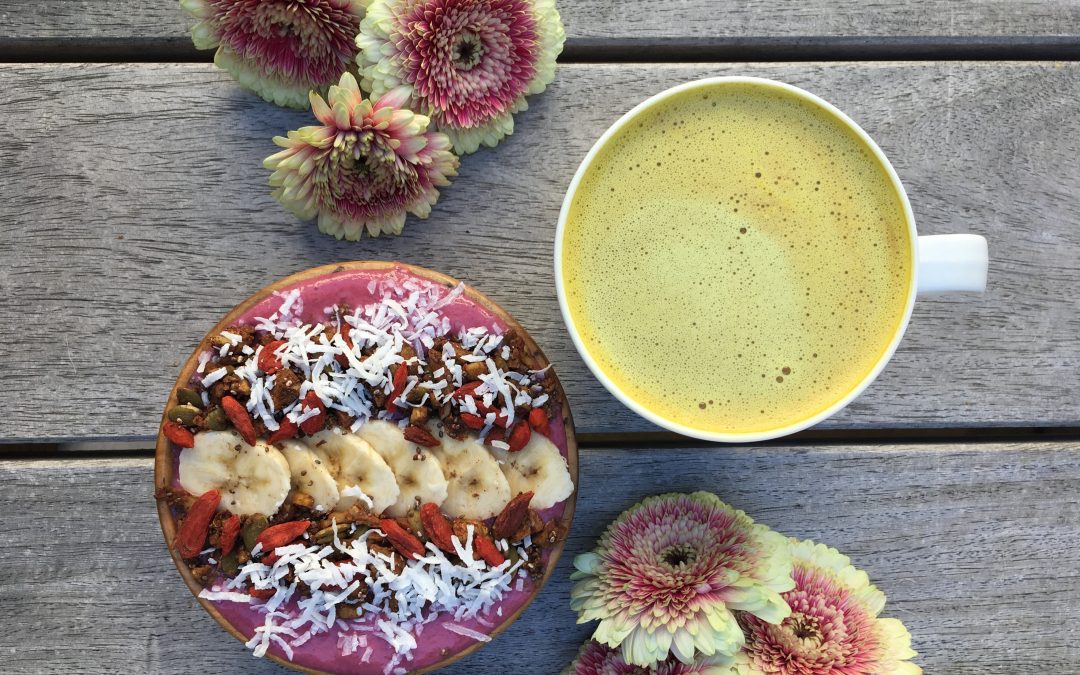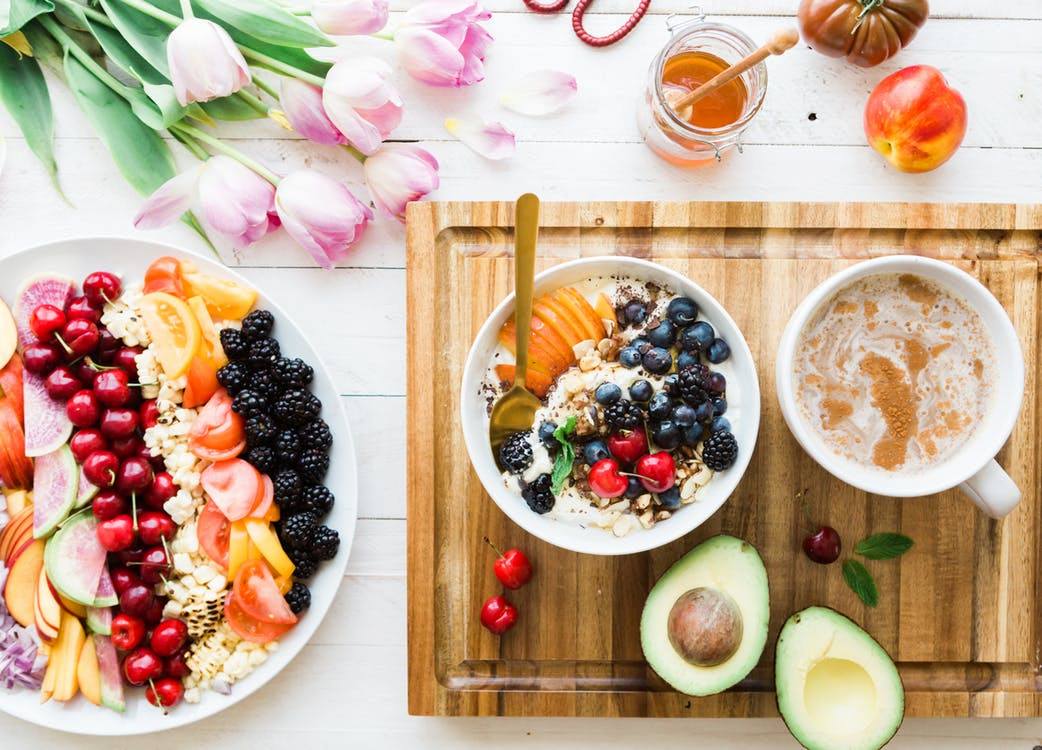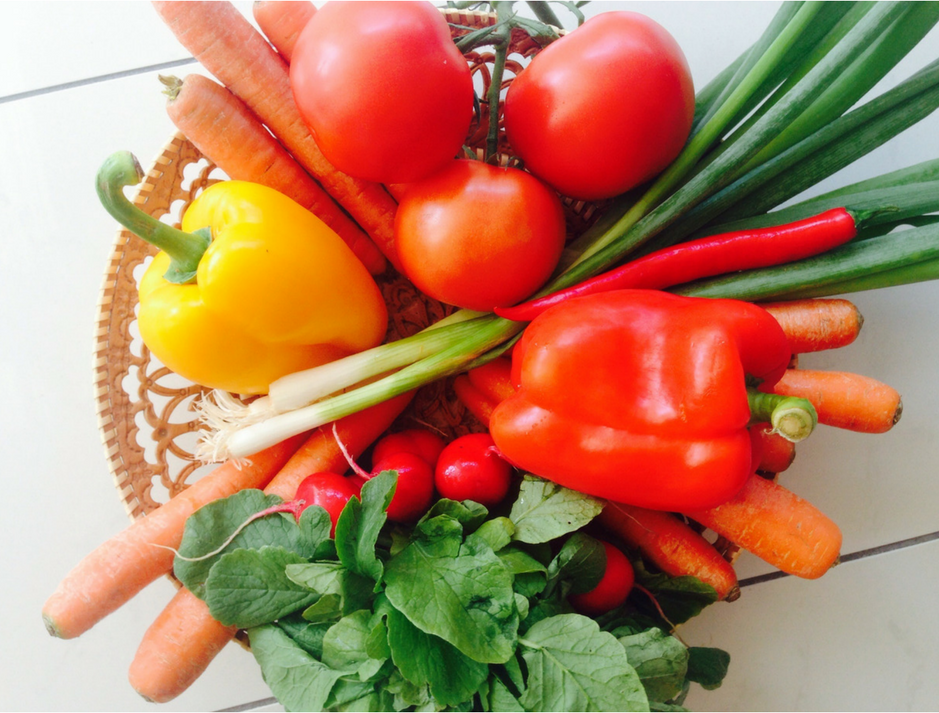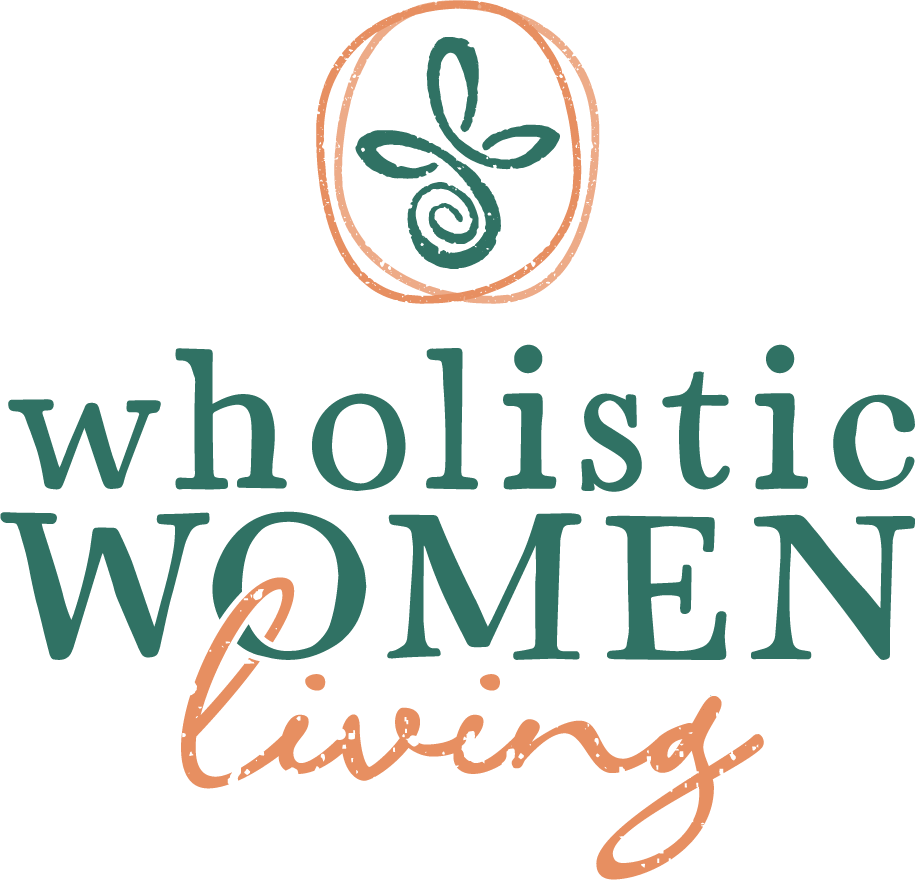
by Kim Wilson | Apr 14, 2020 | Health, Nutrition
As we transition into the spring season, our lifestyle changes and our cravings for nourishment may shift. This could be in the form of food, connection, relationships and other areas of fulfillment. Though this is a natural transition, we are experiencing a time where our day to day is being shifted. We are more limited with food choices as grocery store visits are less frequent. With the warmer temperatures and days of longer sunlight, we want to get outside and play but are now having to stay in and isolate. We are living in an uncertain time and one where many are having to pivot.
There have been some incredible examples of silver lining through this time. We are seeing dining room and kitchen tables converting to church, prayer and home schooling. Families are connecting more through games, cooking in the kitchen and friends are enjoying social time through online spaces. We are discovering new ways to get creative, restructure jobs, express creativity, learn and grow.
I’ve been hearing many women sharing and discussing their desires for a healthier “new normal,” balance, less stress and more self-care. As women, we carry many responsibilities and some of those are being shifted right now. We’re pouring more into our homes, families, relationships, careers and facing additional emotions and feelings. Possibly leaving our own needs and desires on the back burner. Ladies, I am here to tell you that your needs are important. Your self care is part of survival and it’s not selfish.
For me, I’ve had to develop a new routine. I will admit that the first two weeks had some good days and some not so great days. I decided that things needed to change in order for me to discover a new way of life that supporting my health and wellbeing. Not just for my own body and mind but so I could also show up the best possible to serve my family, friends, clients and community.
I set up a daily workout or movement schedule. Using what equipment I had at home and sticking to my gym routine. I created a menu for my meals and a shopping list since I knew trips to the grocery were cutting back. I’ve been connecting more through online platforms to check in with friends and family and connect through coaching. I committed to a Quarantine Kitchen with Kim cooking “show” to help others during this time. It also keeps me accountable to shower daily, get out of my yoga pants and implement self-care. I’m now adding in more Epsom salt baths each week for relaxation, stress management and immune support. These are just a few of my “new norm” routines that support my own bio-individuality.
Creating and implementing new habits and routines will help support you during this time. Maybe your self care looks like an Epsom salt bath. Maybe it’s a Zoom connection with a girlfriend and a glass of wine. Have you been saying “I wish I had more time to cook these recipes?” Well, now we have the time and more connection in the kitchen. While you’re cooking, throw a dance party with your kiddos or spouse. Different areas of life are now merging together and we are discovering how that looks.
Through my coaching programs and working one on one with clients, I emphasize several areas that support one another in life. These areas are fuel for life (nourishing foods), movement for life (whatever movement you enjoy), surrounded for life (relationships), fulfilled for life (passion, purpose, spirituality, and joy) and loved for life (self-care and love). Using a holistic approach, I educate others about how these areas of the “wellness wheel” are connected with one another.
Many if not all of these categories (in addition to careers) are being impacted during this time. They are also connected in many ways. Do you find yourself eating differently now? Maybe you’re feeling stressed, bored, uncertain of your career or experiencing tension in a relationship. Being mindful of how we are feeling, what we are thinking and our overall mindset is very important. Our thoughts, feelings and choices are not only harming or nourishing our wellbeing, but they affect our immune system too.
As we transition through this season and the ones ahead, I recommend reflecting on the different areas of life as mentioned (nourishment, movement, relationships, fulfillment and self-care and career. Where can you make changes? What changes do you think should be made? Would a new routine or schedule assist your mind, body and overall lifestyle? Spring is a great time to detox. Though it may be harder to do so with food right now, it’s a good time to release things that are not serving you well. Consider these areas (above) and see how they are intertwining in your life. Looking at a mind, body and spirit approach. How can you get creative with combining them? How can you nourish them?
Ladies, I tell all of my clients to think about the oxygen mask on the airplane. We have to put ours on first so that we can show up greater for ourselves and others. It’s time to move from the back burner. It’s time to pivot!
Stay safe and well!
by Carol deLaski | Apr 26, 2022 | Health, Kim Wilson, Nutrition
Discover the essential foods that best support your well-being in every season with Health Coach Kim Wilson
Location: Brewer’s Alley (Private Room)
Time: 5:30–7:30 pm
Cost: $30 members | $40 non-members

by Kim Wilson | Aug 29, 2019 | Health, Nutrition, Personal Development, Self-Care
As the kiddos are getting ready to head back to school and summer is coming to a close, I am hearing the words “diet, self-care and balance” from many women. These words came up often this week during my attendance at several women’s networking events for the Frederick County Chamber “She Week.” As women discussed their desire for balance, taking care of themselves while being mothers and entrepreneurs and living fearlessly through uncertainty, it made me think. I wondered; how many women are striving for balance and how many are frustrated with trying to achieve it?
As women, we tend to do everything for everybody. We pour into our families, careers, community, relationships and other areas of life. All while often times placing ourselves on the back burner. This ends up leaving us frustrated, depleted, exhausted, sometimes resentful and overwhelmed. Ladies, can you relate?
So many people think, “I’ll focus on getting my finances in order when I grow myself personally. When I lose weight or feel confident, I will work on building a relationship.” Well, it’s time we said goodbye to the “I’ll be happy when..” mindset. It’s time to live the Nourished Life.
That’s not to say that we won’t do parts of life messy and imperfect. Honestly, I don’t even think that exists. There is no “perfect time, moment or scenario.” It’s important to take action towards the goals we want to achieve, the dreams we want to fulfill and the desires that we feel burning inside of us. We want to have a healthy and fulfilling life aligned with nourishing food, movement, relationships, finances, passions, and joys.
It was through my own struggles and journey that I learned how to live the nourished life for my own bio-individuality. Something I educate and share with other women whom I work with. When I began to implement what I learned through nutrition school and life, I felt empowered. I discovered the foods that supported my own unique body and lifestyle. Foods that reduced inflammation and pain, increased my energy, impacted my mood and emotions. Ladies, you can even increase your sex drive! Not sleeping well? That was me too! Now I sleep well and wake rested and refreshed.
Creating and implementing healthy habits that are designed for your unique, beautiful body not only help increase health and happiness, but it’s also an act of self-care. I understand that self-care comes in many forms and one may work for you but not for your girlfriends. Maybe you don’t like Epson salt baths or find the gym to be “not your thing.” Maybe you prefer grabbing a glass of wine with a friend or taking a walk after dinner with your spouse. Whatever you enjoy that fills your cup. Do it and then do it more.
Through my coaching programs and working one on one with clients, I emphasize several areas that support one another in life. These areas are fuel for life (nourishing foods), movement for life (whatever movement you enjoy), surrounded for life (relationships), fulfilled for life (passion, purpose, spirituality, and joy) and loved for life (self-care and love). Using a holistic approach, I educate others about how these areas of the “wellness wheel” are connected with one another.
Let’s think about it…
How many times have you felt lonely, bored, stressed about your job or frustrated with your spouse and you grabbed the ice cream container or cookie jar? Often our emotions and things that are going on in our world resort to the actions we take (especially with food and other means). I’ve been there and I am sure many of you can relate too!
Being mindful of how we are feeling and what we are thinking makes a huge difference in how we respond to things. Not to mention, our gut health is connected to our brain. So, if we are damaging our gut and microbiome, it’s impacting our thoughts, feelings, and actions. This is another big reason to discover what foods support your own unique body.
As the season changes and summer moves into fall, I encourage you to slow down. Observe the above areas in your life and how they are connected. Where can you make some changes? Where are you not feeling fulfilled and nourished?
Just as the leaves fall from the trees, fall is a season of releasing things that are no longer serving us. Whether they be habits we need to change, toxicity, unhealthy relationships, fears and doubts, emotional baggage from the past. Fall is a great time to detox…mind, body, and spirit.
I encourage you to include more self-care to support your body and mind as you naturally move through this beautiful process. Experiment with things that bring you joy. Get out and try something new. Maybe try a new yoga or cooking class, volunteer, grab some friends and enjoy a picnic at a local winery. Hold yourself accountable by penciling in your “self-care date” into your cute planner like you would a meeting.
Consider the areas I shared and see how you can interconnect them. Discover ways to fill the different areas of your own wellness wheel that work for you and your lifestyle.
Ladies, I say this to all of my clients. Think about the oxygen mask on an airplane. Who has to put theirs on first so that you can show up greater to give back and help others? That’s right..it’s you! So, please take your cute little teapot off of the back burner and start creating or fulfilling your nourished life. This isn’t a trendy new diet or phase. It’s a lifestyle and one you have to stay committed to.

by Casey Clark | Jul 1, 2019 | Health, Nutrition, Personal Development
Every single day we eat and every single one of us eats the amount we do largely because of what is around us. Setting things like emotional and stress eating aside, we often overeat because of family, friends, colors, packaging, plate size, smells, distractions, containers and even the way we set up our kitchen and dining room tables. This list of invisible influences goes on and on.
Invisible? Yes! Most of us are unaware of all of the factors that influence our eating and those that keep us from being in the moment while we eat so that we can pay close attention to how hungry we are, when we get full, what mood we’re in, how good our food tastes and just how much we’ve consumed.
As we all know, increased food consumption typically results in weight gain. If you consume just 3,500 calories, that equals a pound no matter if you consume it all together or over a week. You can revisit my previous blog and learn more about that and the mindless margin. So if increased food consumption often results in weight gain and mindful eating helps us reduce food consumption, wouldn’t that mean that mindful eating can be used for weight loss? Not exactly!
What Mindful Eating Is
Mindful eating is less about what you eat and more about how you eat it. “Ronald Reagan once said, ‘You can tell a lot about a fellow’s character by his way of eating jelly beans’.” Are you one who eats only the flavors you love, eats them all at once or only eats a few and saves the rest? The way you eat them says a lot about the relationship that you have with food.
Mindful eating encourages us to become fully present with food and aware of our relationship with it. We begin to notice if we hide certain things, like jelly beans, when we eat them, if we wolf food down until our stomach hurts or if we avoid some foods like the plague. The more aware you become of your eating habits, the more likely you are to change them and to accept your body for what it does, especially that it has an inherent ability to guide us.
Don’t Mix Mindful Eating and Weightloss
When we mix mindful eating and weight loss, we tend to bring the conflict that we have with food to the surface. We get frustrated because we try to be “mindful” of the carbs we’re eating and don’t lose weight, we try to be “mindful” and drink more water and don’t lose weight. The fact of the matter is, we first have to understand ourselves – heart, mind, body, and spirit.
We have to be connected with ourselves enough to know that there are several other factors that contribute to weight loss and gain. Mindfulness is a tool used to help enhance that connectivity. It helps us learn to be still in all areas of life. Still enough to hear the small things like birds chirping, to be present with the ones we love, to recognize when we have triggers or glimmers in our day-to-day. The connection in our body is a foundational tool that is needed to be able to recognize when that extra slice of pizza puts us over the edge or all that caffeine in the morning causes us to crash in the afternoon which in turn requires more caffeine. With mindfulness comes awareness and with awareness comes a knowing of yourself that you may have never experienced.
I invite you to join me to learn more about yourself, mindful eating and how it can help you in all aspects of your life at our July evening retreat. You will find that practicing mindful eating will bring you much more joy and allow you to live a balanced and fulfilled life.
Today’s author: Casey Clark is a partner coach with Wholistic Woman Coalition. She manages a health and wellness practice, Heaven On Earth, which is a community for those looking to get inspired and give inspiration to anyone on their own health and wellness journey. Having made significant changes to her lifestyle over the past 2 years to live a more holistically fulfilled life, Casey understands the importance of self-care and having a community to get support from. Join the community and get some inspiration or become a guest blogger at www.aheavenlyyou.com.

by Carol deLaski | Apr 13, 2018 | Health, Kim Wilson, Nutrition
As the weather begins to warm up and the days become longer, we may feel a shift in our body and mind. It’s very normal this time of year. It’s a time when our body wants to be rid of things that may have been weighing itself down from the winter. We yearn to feel lighter and refreshed in mind, body, and spirit!
As the seasons change, a cleanse could be very beneficial. Cleansing should occur at least once or twice a year, but it is also suggested that as the seasons change, a good cleanse can better prepare us for the coming season. Just like the temperature, the foods we eat change throughout the year. Going from spring to summer, the body is preparing itself for some of the busiest months of the year.
Traditionally, cultures all around the world have practiced seasonal cleansing in different ways. Springtime is the time to give your liver some extra love too. The liver is how the body removes toxins, and that is how the liver earns the spot of one of the hardest working organs!
The liver works with many other organs in our body to detox blood, produce bile, break down hormones, and act as a storage facility for our vitamins and minerals. If the liver is not functioning properly, it affects many other areas of our body.
Some more important functions of the liver include removing old blood cells, helping the intestines process nutrients, chemical production for blood clotting, the breakdown and metabolizing of alcohol and consumed medications, and the production of necessary proteins and cholesterol. When people hear ‘liver disease’, they typically think of alcoholism, but that is not the only cause of liver disease or failure.
Some other risk factors associated with liver disease include low potassium levels, drug use, exposure to certain chemicals, obesity, processed foods, viral infections, and autoimmune diseases.
If your liver is not performing at its best, you may experience gas or bloating, constipation, heartburn, acid reflux, yellowish tint to skin and eyes, high blood pressure, difficulty losing weight, cognitive difficulties, dark urine, poor appetite, and chronic fatigue.
If you want to support your liver, there are certain foods you should focus on. These foods include beets, carrots, tomatoes, grapefruit, spinach, citrus fruits, cabbage, turmeric, walnuts, avocados, apples, Brussels sprouts, garlic, dandelion root, leafy green vegetables, broccoli, cauliflower, asparagus, green tea, artichoke, olive oil and alternative grains like quinoa, millet and buckwheat.
There are several food programs, supplements and other programs available to cleanse your liver. It’s important to find the one that is best for you. Consult your doctor if you have any concerns or questions.
Below are some general tips that have worked for me:
- Hydrate!
- Eat clean, seasonal, and organic REAL food
- Exercise regularly or incorporate some type of movement
- Practice calming techniques like meditation and relaxation
- Take a good quality probiotic
- Get the proper amount of sleep
- Avoid alcohol and tobacco products
- Avoid processed foods and sugar
Adopting a healthier lifestyle or cleansing into the spring season may provide much more energy, improved digestion, healthier and brighter skin, better sleep, reduced stress, and better mental clarity and cognitive functioning; along with a boost to your immune system and more balanced blood sugar levels.
The spring season isn’t just a time for spring cleaning your closet. It’s important to reflect on things that have been weighing you down or things that may be toxic. Consider different stressors in your life. They play a huge part in your health and body function.
In addition to a spring cleanse, I recommend considering products you may be using, people that are in your life, habits that may need some adjusting, and choices that may or may not be serving you well. Moving forward, listen to your “gut” and give some thought to where small changes could greatly impact your health and happiness. There is no better time to Spring into Better Health!
Today’s author: Kim Wilson is a Certified Holistic Health Coach (CHC) and owns her own business, Kim Wilson, LLC, which specializes in empowering and educating women to get to the root of what’s going on with their own unique, individual body. She works with women one-on-one and coaches through online groups and programs. Learn more about Kim at her website www.kimwilson.me, from her Facebook page, or find her on Instagram.

by Carol deLaski | Oct 13, 2017 | Casey Clark, Health, Nutrition
Mindful. A term that has become increasingly popular over the past few years and in its simplest form means being more aware. But what does being more aware mean? Is it noticing the sounds around you? Noticing the smells around you? Noticing the variety of colors as you pass by the trees? Regardless of what you are more aware of, the point of being mindful is to develop a closer relationship with your mind. So how does being mindful relate to eating?
Mindful Eating
Mindful eating is much more than noticing the smell of your food or the different colors on your plate. Mindful eating is about being present in the moment, in a non-judgmental way, so that you can pay closer attention to your body, habits, and triggers. It’s much deeper than developing a better relationship with your mind. When you mindfully eat, there are no rules, no calorie counting, no carb cutting, and there aren’t even recipes. Just a special sense of awareness every time that food is in your presence.
Why Doesn’t Everyone Eat Mindfully?
I’m sure you’re probably scratching your head wondering why everyone doesn’t eat mindfully since it seems like you can eat so freely. The fact of the matter is, not many people explore mindful eating because of our own harsh beliefs and because of the long look we’ll have to take in the mirror. We tell ourselves things like “You couldn’t even cut carbs for one day. What makes you think you can be mindful of your eating?” or “You’ve gained so much weight, you’ll need more than mindful eating to help you out.” Regardless of what that inner critic is saying, it’s taking on several roles that work against you: the fretter, the punisher, the judge, the name caller, or the partier. There’s a Buddhist saying that states “your worst enemy cannot harm you as much as your own unguarded thoughts,” which is so true! We can’t allow this voice in our head to hinder our progress in doing what’s best for our body.
Often, we are so hard on ourselves and we don’t seek help because we are afraid that people are going to confirm our own negative beliefs or help us stick our heads further in the sand. Therefore, we say nothing and appear as if life is great while under the surface we have a constant struggle stemming from the battle of the good and bad angels on our shoulders.
The Building Block of Mindful Eating
To eat mindfully, we have to address this inner critic with self-compassion. Compassion and empathy are the antidote for our inner critics. We can’t possibly be judgmental toward ourselves while being compassionate. The first part of being more compassionate is simply being aware of our thoughts. Acknowledging when they’re there but not putting any emphasis on them and just allowing them to pass by. When the name caller critic pops up, recognize it and say to yourself, “Oh my, that name caller is back again” and let it be at that. Don’t take a deeper look at it and try to rationalize why it’s there. Just let it go. Once we are aware of thoughts, we must move into being nonjudgmental about them.
Mindless thinkers tend to have more eating issues because they get sucked into this hole of negative thinking patterns and it subconsciously affects their eating habits. Most negative thinking is looked at as extreme thinking which is when something is all or nothing. For example, it’s extreme thinking if you promise yourself that you won’t eat after 7 and then you do, which results in you saying “The heck with it. I screwed it up once so I’m not going to worry about not eating after 7 anymore.” Extreme thinking can be self-sabotaging. We are being so judgmental of our one mistake that we prevent ourselves from trying again and succeeding. Self-sabotage is also a way to control our disappointment, which goes back to negative beliefs like thinking we can’t succeed.
When we self-sabotage, we must become aware and practice non-judgment so that we can look at why we feel a certain way. That’s when we have to take a long look in the mirror and be honest with ourselves in a gentle way, such as by asking ourselves, “Is this to avoid disappointment?” or “Am I afraid of failing?” Knowing the reason is half of the battle.
Judgments and negative self-talk are all a part of mindless eating. Just like we reduce our sugar or salt intake, we must clear our negative thoughts as well. Being self-compassionate allows us to begin this journey. As you move forward in the next few days, be aware of your thoughts toward yourself. Acknowledge your inner critic without putting emotion into it. Try describing things without using words like good or bad. Regardless of whether you want to begin or improve mindful eating or just want to be more mindful in general, be present and be kind to yourself!
Today’s author: Casey Clark is an affiliate coach with Wholistic Woman and manages a health and wellness practice, Heaven On Earth, which focuses on self-care. Having been a student and working, both full-time, Casey has a deep understanding for the importance of self-care and is committed to helping those who lead busy lives, especially young professionals, accomplish prioritizing self-care so that they can live a holistically balanced, well and fulfilled life. She uses her own experiences as a motivator to help her clients achieve lasting, self-compassionate change that is aligned with their values. Find out more about Casey at her website: www.aheavenlyyou.com






